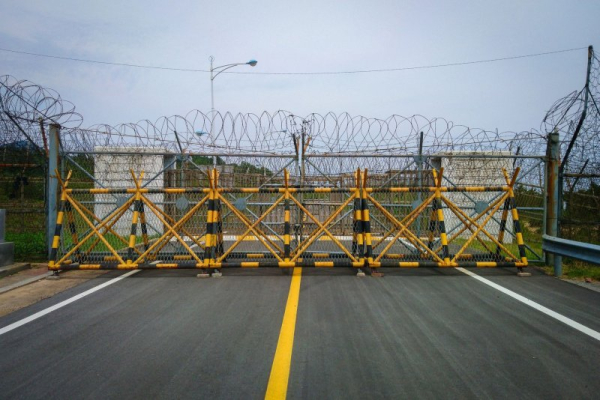
North Korea’s rubber-stamp parliament abolished laws on inter-Korean economic cooperation, state media reported Thursday, including regulations around the Mount Kumgang tourism region. This heavily fortified gate in the DMZ has blocked the road to Mount Kumgang since operations were suspended in 2008. File Photo by Thomas Maresca/UPI | License Photo
North Korea abolished its laws on inter-Korean economic cooperation, state-run media reported Thursday, further straining ties with South Korea as relations remain at a low point.
The move was made Wednesday at a plenary meeting of the Supreme People’s Assembly, North Korea’s rubber-stamp parliament, according to Korean Central News Agency. Advertisement
The assembly adopted a decree on “abolishing the law of the DPRK on North-South economic cooperation,” KCNA reported.
The Democratic People’s Republic of Korea is the official name of North Korea.
The SPA also scrapped a law regulating the Mount Kumgang special tourism zone, a scenic North Korean mountain resort area that was once a destination for South Koreans.
The mountain became a rare symbol of cooperation after it opened to South Korean tourists in 1998 during the “Sunshine Policy” period of inter-Korean engagement. The resort region was expanded in 2002, with much of the infrastructure developed by an affiliate of South Korea’s Hyundai conglomerate.
Nearly 2 million South Koreans visited the site before operations were suspended in 2008 when a 53-year-old tourist was fatally shot by a North Korean soldier near a restricted military area. Advertisement
The latest policy changes come as tensions are at their highest in years between the two Koreas, with a steady stream of fiery rhetoric and military provocations coming from the North.
Last month, North Korea publicly rejected its long-held goal of unification with the South, with leader Kim Jong Un calling for a constitutional change to define South Korea as its “primary enemy state and invariable principal enemy.”
Pyongyang has conducted a flurry of weapons tests in recent weeks, including four cruise missile launches and the test-firing of a new intermediate-range solid-fuel ballistic missile with a hypersonic warhead.
In November, the North withdrew from a 2018 inter-Korean military pact meant to reduce tensions in the border area after launching its first spy satellite.
While North Korea has shown little interest in diplomatic engagement with Washington or Seoul, it has strengthened ties with Russia and is believed to be supplying artillery and missiles to Moscow for its invasion of Ukraine.
Deputy U.S. Ambassador to the United Nations Robert Wood said Tuesday that Russia had fired North Korean ballistic missiles at least nine times in its operations against Ukraine. Advertisement
South Korea’s Ministry of Unification, which oversees inter-Korean affairs, said Thursday that Seoul does not recognize the North’s unilateral termination of the cross-border economic agreements, according to public broadcaster KBS.